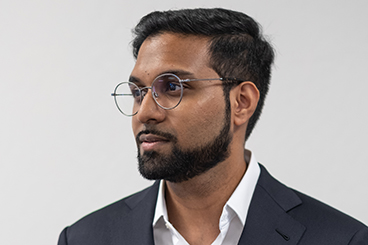Malinka Walaliyadde, a former partner at Andreessen Horowitz, co-founded AKASA on a mission to remedy the financial complexity crippling U.S. healthcare. The company pioneered a new approach called Unified Automation. It provides hospitals and health care systems with a single solution that uses the same artificial intelligence (AI) and machine learning (ML) technology employed by driverless cars to improve the efficiency, accuracy, and scalability of healthcare operations, starting with revenue cycle management (RCM).
Health Evolution interviewed Walaliyadde to learn how AKASA is enabling health systems to reduce their cost of care and be better stewards of the health care dollar, along with his journey as founder of a rapidly growing Silicon Valley health care tech company that recently raised $60million in its series B round of funding.
What is the inspiration fueling AKASA or its origin story?
Walaliyadde: Prior to starting AKASA, I was a partner at Andreessen Horowitz (a16z), a venture capital firm in Silicon Valley with $16.5 billion in assets under management. I helped start their health care investment team, and worked on almost $250 million of investments across about 20 health care companies, ranging from new providers, payers, biotech companies, and health technology companies.
During my time at a16z, we invested in and evaluated a lot of great clinical-facing health care companies. But when they needed to commercialize and plug into the financial infrastructure of health care, these businesses realized how difficult it was. I saw it happen time and time again.
No one was solving systemic issues in the back end of health care with modern technology approaches. There was a lack of new technology in the field and nothing being purpose-built. It became clear to me that you could use technology like AI and ML to solve these operational challenges in an innovative way.
My co-founders and I looked at this issue as a team of complimentary experts: individuals with health care expertise and with PhDs in AI and ML. We understood that the constant change in the revenue cycle and other core health care operations required a dynamic, comprehensive approach to address the inherent inefficiencies. The patchwork of currently available solutions could never accomplish that. We knew we had our foundational concept for a startup.
How does your technology help healthcare organizations?
Walaliyadde: In the U.S., the complexity of health care reimbursement drives up hidden costs that affect what every consumer pays and erodes the trust people have in the health care system. It’s a massive, deeply embedded problem. At AKASA, our mission is to fix it.
How? With Unified Automation. United Automation is a flexible AI-based solution that operates within a health care system’s existing electronic health record (EHR) and revenue cycle infrastructure, automating complex administrative tasks, reducing errors, and improving efficiencies. It can be deployed completely remotely, and our expert-in-the-loop technology works with AKASA’s team of in-house revenue cycle and operations experts to ensure that exceptions and edge cases are resolved, and the system learns from those actions in real-time.
Consequently, this solution can help address the biggest challenges in health care, which, in my view, fall into two main categories:
The first pertains to the traditional hurdles health care organizations have faced, including how to manage an efficient operational back end and how to provide a positive patient financial experience, while also navigating an overly complex reimbursement environment.
The other category relates to the trials and tribulations that have emerged due to the pandemic. Health systems across the country have seen significant decreases in the number of elective procedures and patient volumes. That volume is now returning in waves. Health system leaders must be prepared with the right amount of staffing and resources to accommodate this unpredictability.
How should prospective clients plan AI and automation rollouts?
Walaliyadde: My recommendation is to be practical in the short term and ambitious in the long term. Many health care leaders have had their vision capped by negative experiences with technology like basic robotic processing automation (RPA) that doesn’t scale or deal well with complex environments.
It’s important to start with automation of critical tasks in the short term, so you can generate near-term value quickly for customers and build a foundation on which you can deploy generational long-term investment.
At AKASA, we’re also developing AI-based predictive solutions, such as denials prediction. Not just the automation of workflows, but preventing unnecessary workflows from happening in the first place. Being able to predict these types of inefficiencies with a high level of accuracy is a significantly harder problem than automation. We’re already doing it with some customers, and believe it will really come to bear for the entire industry in the coming years.










